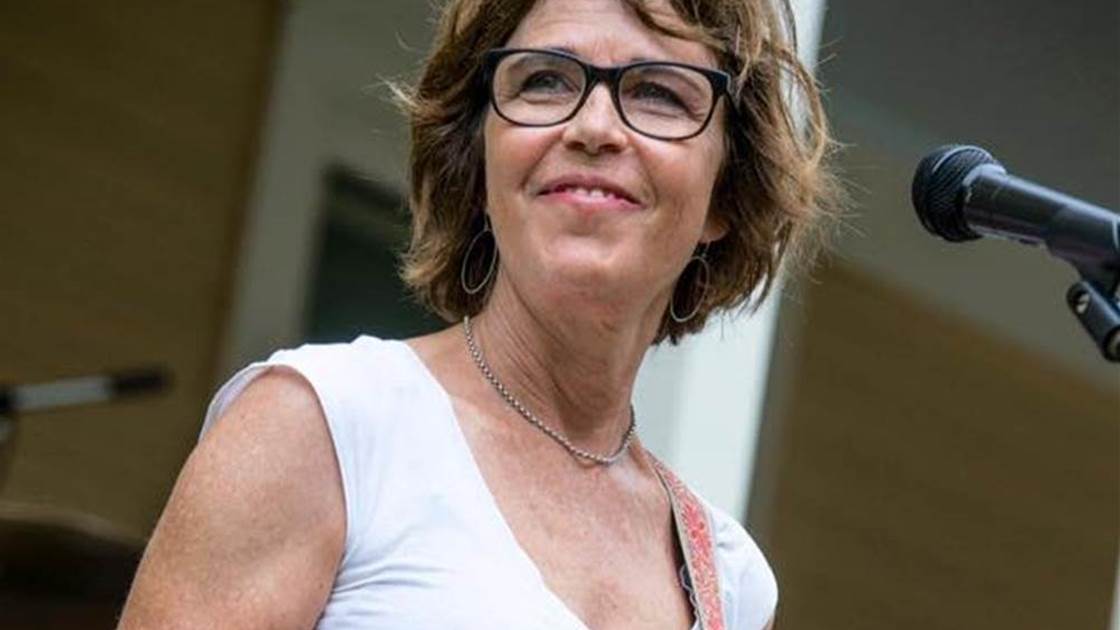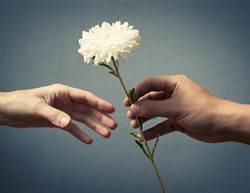After decades as a music critic covering major artists like Sting, R.E.M. and Madonna, Joan Anderman quit her job as the Boston Globe's pop music critic in 2010 to flip the script and become a songwriter herself. Eventually, she faced her stage fright and stepped into the spotlight to perform her own music, too. Joan, now 58, tells her story:
My whole adult life I’ve worked as a music journalist. I’ve always been in love with pop music, in love with songs. Like so many girls do, I had fantasies as a teenager of becoming a rock star. But for a variety of reasons, I didn't have the courage, or the wherewithal, or the spirit of adventure to join or start a band. I think part of the reason I chose the career I did was so that I could keep that fantasy alive in my life without exposing myself to the riskier, more vulnerable parts that come along with putting yourself out there as a musician.
So I decided to combine my love of music and language and become a critic. After graduating with a degree in English, I landed a year-long internship writing entertainment listings. Following my internship, they hired me as their rock critic. Some years later, after a stint in San Francisco, I moved east to become the pop music critic for the Boston Globe.
These were the good old days when newspapers still had some money to spend, so I got to do things like travel to music festivals and conferences, and cover opening concerts of big music tours. I wrote album and concert reviews, conducted interviews with musicians, and wrote artist profiles. I once interviewed Michael Stipe of R.E.M. while lying face-to-face in a hammock in the backyard of a BBQ joint. Our bodies were smashed together and it was really hard to focus on my list of questions—thankfully he’s a great conversationalist. Another time I hung out at Sting's home in London with his family and witnessed he and his wife Trudie arguing about how much video game time to allow their kids after school, which was a real treat. (Stars, they’re just like us!) It was a great job.
It would be nice to say that turning 50 was some sort of beacon in the night for me, a trigger that led me to quit, but it really wasn’t. The newspaper industry was changing and contracting, and at the same time, I was beginning to feel a restless discontent I couldn’t quite name. It was clear it was time for me to shift gears, both personally and professionally. People often say to me, "Oh, so cool you changed careers," but that's not exactly the case. I don’t think of what I did as a wholesale rejection of my career. I’m still in music; I’m just engaging with it in a whole new way.
As somebody who writes for a living, lyrics seemed to be the easiest and most logical entry point to my personal odyssey, a satisfying extension of my work as a writer. I never had any intention of performing; In fact, the prospect of playing music with other humans terrified me. I swore up and down to anybody that would listen that I would never, under penalty of death, get up on stage. But after a while, I realised that sitting up in my attic in my house teaching myself how to write songs wasn't really the end game. It slowly dawned on me that I would need to go out and share this with other people.
I was blogging about my late-life music odyssey and Dan Zedek, then the design director at the Boston Globe, who oddly enough I didn’t know, became a faithful reader and offered lots of support and encouragement in the comments section. He’s a terrific musician and songwriter, and he started sending me some of his songs, which I loved. In 2012, he convinced me to get together with him and his friend John Kehe, another songwriter and our original drummer, for casual Sunday afternoon song circles in John’s basement. It was so much fun we decided to become a band, calling ourselves Field Day. We found a bass player—Phil Magnifico—and in 2013, started playing shows.
It’s not uncomplicated, getting up on a stage underneath a spotlight, as a woman at an age where you’re supposed to get more invisible. This is a pretty youth-centric society we live in, and perhaps no aspect of that society is as ageist as pop music. For a long time, performing felt like an out-of-body experience. I would play a show and literally have no memory afterward of what had happened. I used to just stare down at my guitar, but now I actually sometimes make eye contact with people. Songs really aren't isolated things. They’re a form of communication. It feels like you're having some kind of conversation, some kind of dialogue. You're in a feedback loop: with the people you're playing music with, with the people you're playing music for—it really is electric.
I knew, when I embarked on this journey, that it was a very goofy age for me to be picking this up. But that felt kind of exciting to me, too, to be honest. It felt transgressive. And it still feels kind of transgressive, to be doing this at such an oddly advanced age. I'm in this band that's a working band now—we're putting out a new EP on September 9—and that surprised me as much as it surprised anybody else. Part of the beauty of doing this at this stage of life is that I don't have commercial aspirations, per se. I'm not trying to land the big record deal or become famous. What I really want to do is develop as a musician and a songwriter and a performer. There's a certain purity to it.
One of the hardest things about getting older is the sense of diminishing possibility. We have all kinds of euphemisms for it, like, “that ship has sailed,” or “that train left the station.” But there are a heck of a lot of things we can do, even if it seems like kind of an unusual time to do them. Our limitations largely exist in our mind and in the messages we receive in the media and in our youth culture. The world is more of an open book that we think it is.
I also think feeling the sense of your own mortality is a very profound thing. It can be frightening and kind of overwhelming, the idea that time is limited, that the future no longer unfurls in front of you like some gauzy endless string of possibilities. But the flip side of that is your finiteness is really fuel. It’s certainly fuel for me. Midlife isn’t just a long slippery slope into old age and death. You can do all kinds of interesting, exciting things. This can be an incredibly sweet, full, savoury time of life. It's very much analogous to a ripe piece of fruit, just at its peak before falling off a tree. And it's unsettling for the exact same reason.
Part of me feels a little bit wistful that I didn't take this risk back when I was young, that I waited until now. What would have happened, I wonder? But I think I've come around to the belief that I had to develop and evolve as a human being over the course of my life to this point in order to be ready. Being in this band is the joy of my life. I just want to do this for as long as it lasts. In a way, it feels like I’m just getting started.









